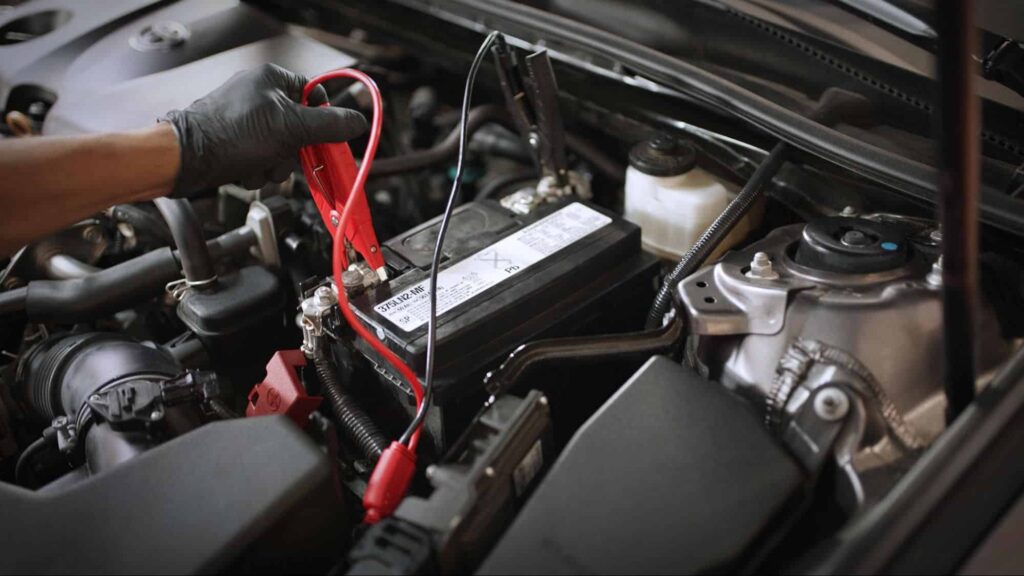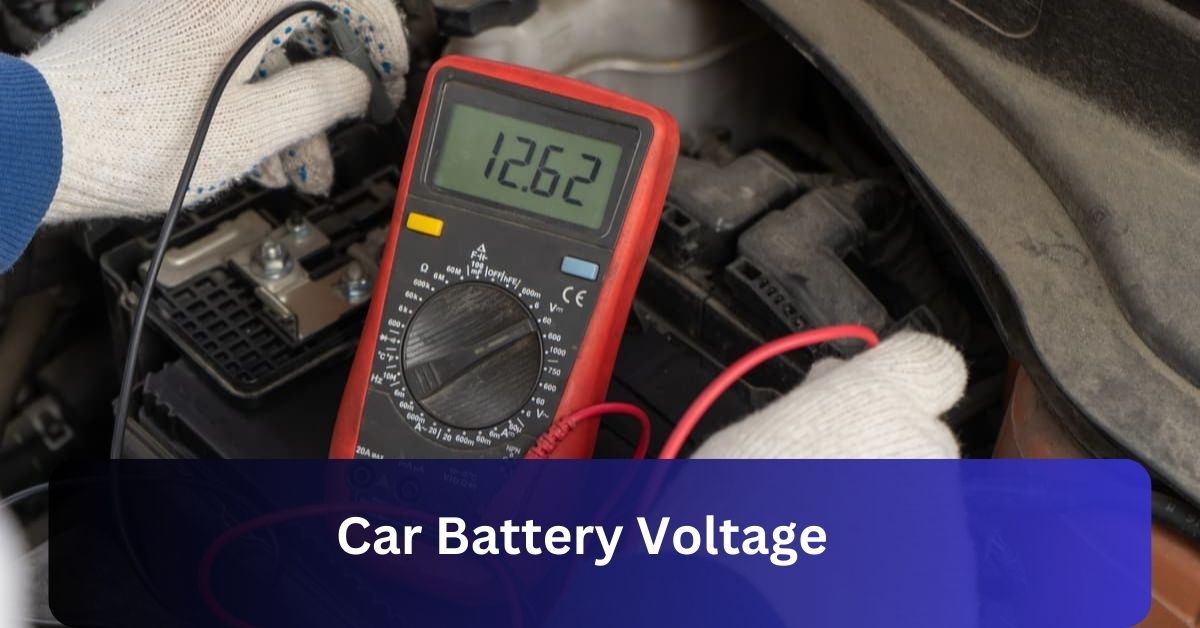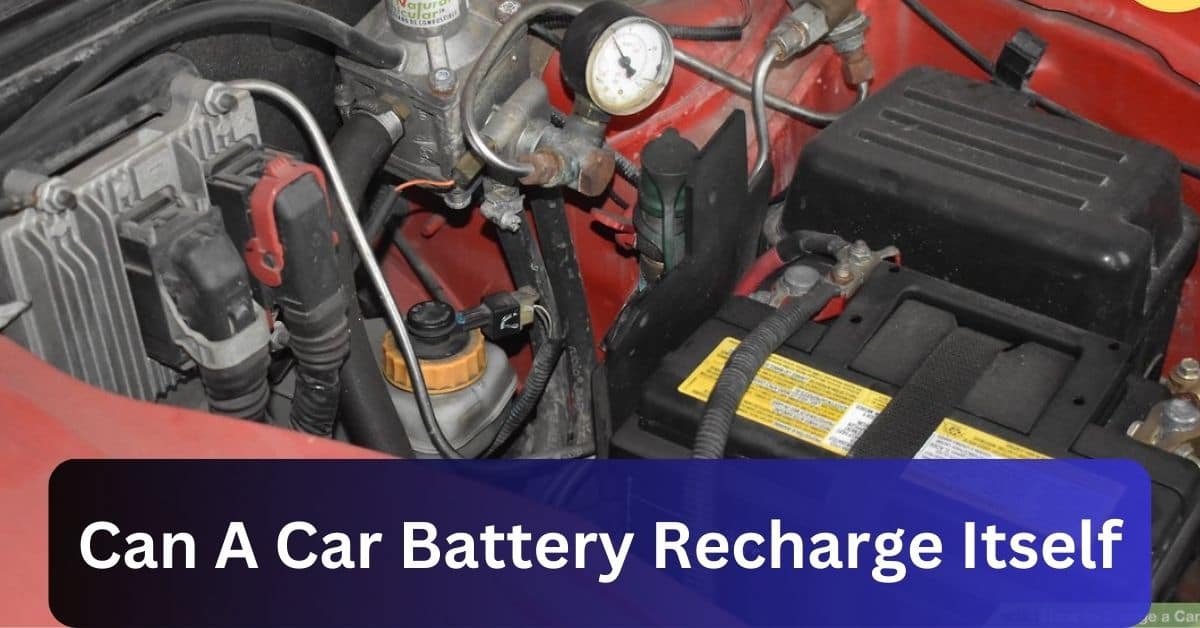Car Battery Voltage is the amount of electrical power in your car’s battery. Voltage can range anywhere from 12.6 to 14.4 also a good battery should show about 12.6 volts or more when fully charged. Checking this voltage often helps your car start easily and run well.
In this article, we’ll talk about what car battery voltage means and why it’s important for your car. We’ll also cover how to check your battery’s voltage and what to do if it’s too low.
How Do Car Batteries Work?
Car batteries function through a chemical reaction that produces electrical energy. Inside the battery, lead and lead dioxide plates are submerged in an electrolyte solution of sulfuric acid. This chemical reaction creates electrons, generating electrical current.

When you turn the ignition, the battery delivers this stored energy to the starter motor, which cranks the engine. Once the engine is running, the alternator takes over, replenishing the battery’s charge.
Using a Car Battery Tester:
Using a car battery tester is an easy way to check your battery’s health. Simply connect the tester’s clips to the battery terminals red to positive and black to negative. The tester will show you the voltage reading.
If it’s below 12.4 volts, the battery may need charging. Regular testing helps you catch issues early, so you can avoid being stranded with a dead battery.
Testing Car Battery Without Multimeter:
If you don’t have a multimeter, you can still check your car battery’s health with a few simple methods:
- Headlight Test: Turn on your car’s headlights for about 10 minutes. If they appear dim, it may indicate a weak battery. Bright lights suggest a stronger battery.
- Voltmeter on Dashboard: Some cars have a built-in voltmeter. Check the reading when the engine is off; a healthy battery should show around 12.6 volts.
- Jump Start Test: If your car starts after a jump, but struggles to start again later, it may indicate a weak battery.
How to Test a Car Battery?
Testing your car battery is a simple process that helps you assess its health. Here’s how to do it effectively.

Gather Your Tools:
To start, make sure you have a car battery tester or a multimeter handy. If you don’t have either, you can still use some alternative methods to check the battery.
Prepare Your Vehicle:
Before testing, turn off your car completely. This means ensuring all lights and electronic devices are shut off to get an accurate reading.
Connecting the Tester:
When you are ready to test, you can connect the battery tester. For a battery tester, attach the red clip to the positive terminal (+) and the black clip to the negative terminal (–). If you’re using a multimeter, set it to the DC voltage setting and connect the clips in the same manner.
Reading the Voltage:
Once connected, check the display on your tester. A fully charged battery should show approximately 12.6 volts or higher. Different readings indicate various charge levels: 12.4 volts means it’s 75% charged, while anything below 12.0 volts suggests it may need recharging or replacing.
Performing a Load Test:
If you want to go a step further, consider doing a load test. Start your car and check the voltage again; it should remain above 10 volts.
Interpreting Your Results:
After testing, assess the results. If your battery shows low voltage, clean the terminals and try recharging it. If it consistently tests low, it’s likely time for a replacement.
Read Also: Do Car Batteries Need Water – Everything You Need To Know!
What Voltage Should a Car Battery Be?
- 12.6 volts and above: Fully charged
- 12.4 volts: 75% charged
- 12.2 volts: 50% charged
- 12.0 volts: 25% charged
- 11.8 volts and below: Discharged or weak
What Voltage Is Too Low for a Car Battery?
A car battery is considered too low when it reads below 12.0 volts. At this level, the battery may struggle to start your car and could be weak or discharged.

If the voltage drops below 11.8 volts, it’s usually time to recharge or replace the battery. Regularly checking your battery’s voltage can help you avoid unexpected problems and keep your vehicle running smoothly.
At What Voltage Is a Car Battery Dead?
A car battery is typically considered dead when it drops below 10.5 volts. At this point, it cannot provide enough power to start the engine or run electrical systems effectively.
If your battery frequently shows this low voltage, it’s important to recharge it or replace it soon. Regular checks can help prevent getting stranded and ensure your car starts reliably when you need it.
At What Voltage Should You Replace a Car Battery?
You should consider replacing your car battery if it consistently reads below 12.4 volts after a full charge. This indicates that the battery is struggling to hold a charge and may not perform well.
If the voltage falls below 12.0 volts, it’s time to consider getting a replacement battery. Regular monitoring can help you avoid sudden failures and ensure your vehicle runs smoothly.
Read Also: Charge Car Battery How Long – Understanding Charge Battery!
Low Voltage Output – Causes and Solutions!
Low voltage from your car battery can cause starting problems and affect how well your car runs. There are several reasons this might happen. First, if your battery is old usually over 3 to 5 years it may not hold a charge well anymore. If you have any case it’s time to replace it.

A common issue is corrosion on the battery terminals. This buildup can block electricity from flowing. Cleaning the terminals with a mixture of baking soda and water can help keep connections clear.
Sometimes, electrical parts like lights or radios might stay on when the car is off, draining the battery. Always double-check that everything is turned off.
Extreme temperatures also play a role; very cold weather can weaken the battery, while too much heat can damage it. Keeping your battery protected from these conditions can help it last longer.
Lastly, if the alternator is not working well, it won’t charge the battery properly, leading to low voltage. If you suspect this, have a mechanic check the alternator.
By understanding these causes and taking action, you can keep your battery in good shape and avoid car troubles. Regular checks and simple maintenance are very important.
Frequently Asked Questions:
1. How often should I check my car battery voltage?
It’s a good idea to check your battery voltage every few months or before long trips.
2. Can cold weather affect car battery voltage?
Yes! Cold temperatures can reduce battery efficiency and voltage output.
3. How long does a car battery typically last?
Most car batteries last 3 to 5 years, depending on usage and maintenance.
4. Can I jump-start a battery with low voltage?
Yes, but ensure the battery isn’t damaged. If it’s below 10.5 volts, consider replacing it instead.
5. What should I do if my battery keeps dying?
Check for parasitic draws, inspect connections for corrosion, and consider battery replacement if it’s old.
Conclusion:
Regularly monitoring your car battery voltage is essential for maintaining a reliable vehicle. A fully charged battery ensures smooth starts and optimal performance.
By understanding voltage levels, causes of low voltage, and proper maintenance, you can extend your battery’s life and avoid unexpected breakdowns on the road.





